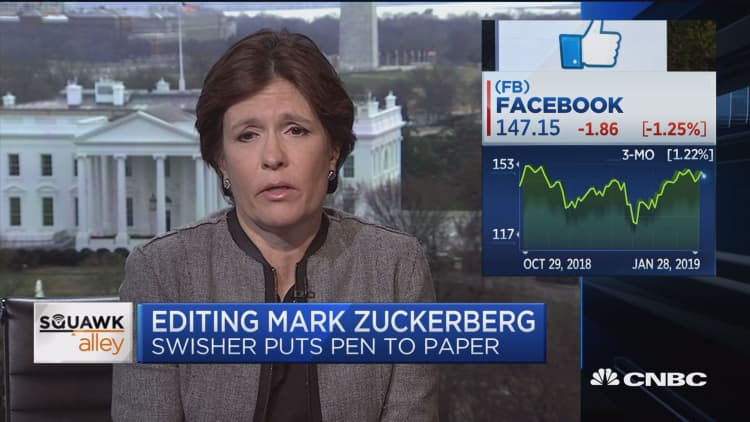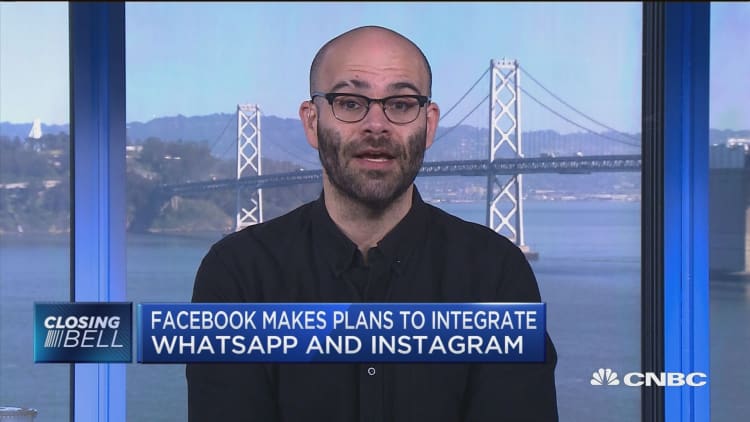Facebook has been paying people to install an app that allows the tech giant to collect data on how they use their smartphones.
Since 2016, the social networking giant has been paying teenagers and adults up to $20 a month plus referral fees to install the so-called "Facebook Research" app on their Apple or Android phones, according to tech news site TechCrunch.
To mask Facebook's direct involvement, the program is said to be administered through beta testing services Applause, BetaBound and uTest and is referred to as "Project Atlas."
A security expert told the publication that the app allows Facebook to collect data including private social media messages, photos and videos sent via instant messaging apps, emails, web searches and web browsing activities. It can also track ongoing location information from other location tracking apps installed in the user's phone, according to the report.
A Facebook spokesperson acknowledged the company is running the program to gather data on usage habits and has paid users for their participation.
"Like many companies, we invite people to participate in research that helps us identify things we can be doing better," the spokesperson told CNBC in an emailed statement.
"Since this research is aimed at helping Facebook understand how people use their mobile devices, we've provided extensive information about the type of data we collect and how they can participate."
"We don't share this information with others and people can stop participating at any time," the spokesperson added.
The move from Facebook could potentially be a violation of Apple policy since many of the users on board the program are installing the app on iPhones.
Facebook is now pulling the app from all Apple devices following the TechCrunch report. The app will remain available for Android users. In a follow-up statement, the firm said that "key facts" about the research program had been ignored.
"Despite early reports, there was nothing 'secret' about this; it was literally called the Facebook Research App," a Facebook spokesperson told CNBC in an emailed statement. "It wasn't 'spying' as all of the people who signed up to participate went through a clear on-boarding process asking for their permission and were paid to participate."
The company admitted that teens had participated in the program but clarified that "less than 5 percent" of the people involved were in their teens.
"All of them signed parental consent forms," the spokesperson said.

For its part, Apple has revoked some developer privileges from Facebook following the TechCrunch report.
A spokesperson for Apple told CNBC that Facebook violated its policies by distributing "a data-collecting app to consumers." Apple has revoked Facebook's "enterprise certificates" that let it distribute the activity-tracking app to users.
"We designed our Enterprise Developer Program solely for the internal distribution of apps within an organization. Facebook has been using their membership to distribute a data-collecting app to consumers, which is a clear breach of their agreement with Apple," the spokesperson said.
Last year, Apple removed Facebook's Onavo security app from the App Store because it did not comply with its privacy rules that stated apps "should not collect information about which other apps are installed on a user's device."
Facebook has been the target of much criticism over the way it handles user data, especially after it was revealed that the data of 87 million users had been improperly shared with political consultancy Cambridge Analytica.
The news led to increased political scrutiny of Facebook's business model — in particular its use of target advertising, which entails the optimization of ads based on a user's interests and clicking habits.
Facebook CEO Mark Zuckerberg recently penned a 1,000-word op-ed in the Wall Street Journal jumping to the defense of his company's business practices. Zuckerberg said people often "assume we do things we don't do," like selling user data.
Just a day after Zuckerberg's article was published, a New York Times report said the firm planned on integrating messaging functions across WhatsApp, Instagram and Messenger. The news resulted in a top European data watchdog calling for an urgent meeting with the company on its integration plans, over concerns that the move could compromise new data privacy legislation.
WATCH: Integrating Facebook's apps might make it harder to break up company in the future




